Our approach to raising American Guinea hogs is driven by a deep commitment to sustainability, animal welfare, and responsible farming practices. Our intentional decision to keep a small pig herd size is a reflection of our dedication to preserving and nurturing the natural grazing areas on our farm.
Lots of clean air and sunshine like nature intended
TnF Farms had approximately 3 dedicated acres of carefully fenced pasture, forested areas, and creek bottoms where our pigs roamed freely. This approach allowed them to graze on real, unprocessed food. It also ensures they had access to diverse environments, from sunny pastures to cool forested areas and refreshing creek beds. To further enhance their well-being, we’ve created a man-made sand-bottom wallow. Our American Guinea hogs also had access to a natural spring, allowing them to cool off and enjoy a bit of mud as they pleased.
Our commitment to the welfare of our hogs extends to how we sheltered them. Multiple well-constructed shelters were strategically placed across the pasture, providing our hogs with relief from the weather, be it rain, shine, or wind.
Healthcare for our hogs was a top priority. Regular veterinary maintenance ensured that they were in optimal health, and we took a proactive approach to disease prevention, minimizing needs for antibiotics or hormones.
Challenging stereotypes
It’s essential to challenge common misconceptions about pigs. While they are often stereotyped as “dirty” and “mean,” these traits are not inherent but rather situational. Pigs can be clean animals if they haven’t been rooting in the soil or cooling off in mud. They also do not defecate where they sleep. American Guinea hogs, in particular, are known for their mild temperament, and ours were no exception. Regular interaction with our hogs fostered a bond that makes them behave more like outside dogs, further challenging stereotypes and emphasizing their amiable nature.
At TnF Farms, our approach to raising American Guinea hogs is a testament to our values of sustainability, compassion, and ethical farming practices. We take great pride in providing our hogs with a nurturing and natural environment where they can thrive and lead contented lives.
- Pasture and forest vegetation including roots, tree nuts and fruit
- Wildlife and insects living in the grass and streams
- Hay
- Fruits and vegetables year round, pumpkin and squash in the fall
- Supplemental freshly milled mineral blend from a local feed store
- The American Guinea hog is a Heritage breed
- Smaller, black pigs with a good temperament
- Adults can grow to 400 pounds
- Great tolerance for the Florida weather
- Flavorful, tender, darker pork
- Excellent for bacon, charcuterie, sausages and lard
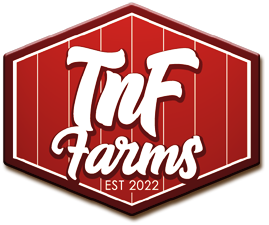
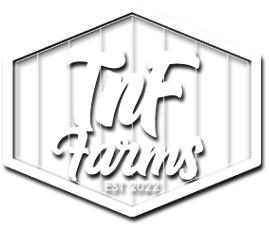
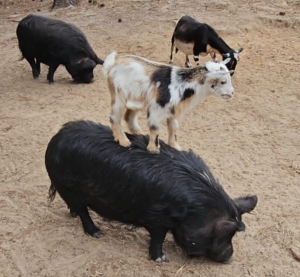
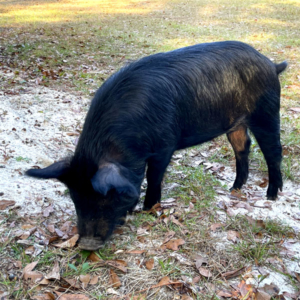
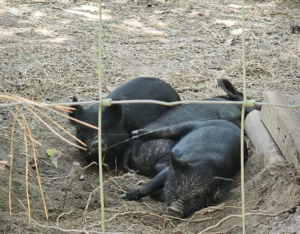
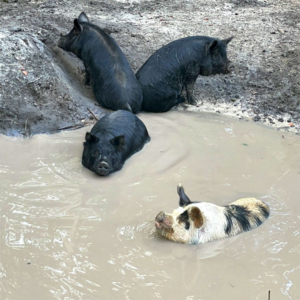
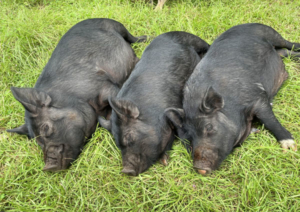
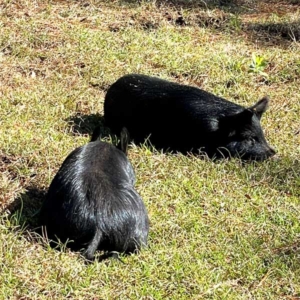
Farm Animals Make Life Better
/in American Guinea Hogs, Farm Animals, Florida Living, Nigerian Dwarf Goats, Nubian Goats, Poultry/by KaitlynI am a frequent visitor to TnF Farms, usually about once a month for a few days. I have been visiting the last few years since Tim and Faith moved to Tallahassee to start their farm. I am no stranger to farm life, as I have had horses growing up, and I much prefer it over city living. During my visits, I help Faith with farm chores, lend a helping hand on projects, become a goat midwife, and get my much-needed farm fix. I have always had a deep connection with animals in general, but there’s just something inherently special about farm animals.
Should You Grow Ryegrass?
/in American Guinea Hogs, Farm Animals, Homesteading, Nigerian Dwarf Goats, Nubian Goats, Poultry/by TimBeyond its role as a forage crop, rye grass plays a crucial role in environmental conservation. Its ability to prevent soil erosion, particularly on slopes or vulnerable terrain, has made it a preferred choice for cover cropping. As a cover crop, ryegrass forms a protective layer over the soil, reducing the risk of erosion and promoting soil health. Additionally, its quick growth makes it an effective ground cover in lawns and pastures, providing an aesthetically pleasing green carpet. Whether utilized for livestock feed, erosion control, or ornamental landscaping, ryegrass stands out as a resilient and adaptable grass species with multifaceted benefits.
Ranching in the Sunshine State
/in American Guinea Hogs, Florida Living, Homesteading/by TimRanching in the state of Florida holds a unique and enduring place in the history and culture of the Sunshine State. Florida’s ranches have a rich heritage dating back centuries and continue to play a vital role in the state’s agricultural and economic landscape. Let’s look into the fascinating world of Florida ranching, from its historical roots to its modern practices, while also exploring its economic significance, cultural impact, and the challenges it faces.